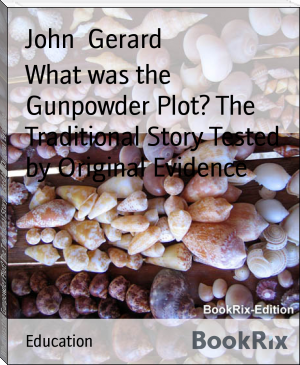What was the Gunpowder Plot? The Traditional Story Tested by Original Evidence - John Gerard (interesting novels in english txt) 📗

- Author: John Gerard
Book online «What was the Gunpowder Plot? The Traditional Story Tested by Original Evidence - John Gerard (interesting novels in english txt) 📗». Author John Gerard
Whether it be so or not we have now to inquire.
FOOTNOTES:
[3] So he himself always wrote it.
[4] Also described as "Great Horses," or "Horses for the great Saddle."
[5] "The great object of the Government now was to obtain evidence against the priests."--GARDINER, History of England, i. 267. Ed. 1883.
[6] See his despatch in reply. Irish State Papers, vol. 217, 95. Cornwallis received Cecil's letter on November 22nd.
[7] See Harington's account of the king's message, Nugæ Antiquæ, i. 374.
[8] To Favat. (Copy) Brit. Mus. MSS. Add. 6178, fol. 625.
[9] Statutes: Anno 3^o Jacobi, c. 1.
[10] This work was taken in hand by the Commons, when, in spite of the alarming circumstances of the time, they met on November 5th, and was carried on at every subsequent sitting. The Lords also met on the 5th, but transacted no business. Journals of Parliament.
[11] Tresham had died in the Tower, December 22nd. Although he had not been tried, his remains were treated as those of a traitor, his head being cut off and fixed above the gates of Northampton (Dom. James I. xvii. 62.)
[12] "That which remaineth is but this, to assure you that ere many daies you shall hear that Father Garnet ... is layd open for a principall conspirator even in the particular Treason of the Powder."--To Sir Henry Bruncard, P.R.O. Ireland, vol. 218, March 3rd, 1605-6. Also (Calendar) Dom. James I. xix. 10.
[13] In Lent, 1603-4. Easter fell that year on April 8th.
[14] "About the middle of Easter Term."--Thomas Winter's declaration, of November 23rd, 1605.
[15] "Keyes, about a month before Michaelmas."--Ibid. About Christopher Wright there is much confusion, Faukes (November 17th, 1605) implying that he was introduced before Christmas, and Thomas Winter (November 23rd, 1605) that it was about a fortnight after the following Candlemas, i.e., about the middle of February.
[16] The form of this oath is thus given in the official account: "You shall swear by the blessed Trinity, and by the Sacrament you now propose to receive, never to disclose directly or indirectly, by word or circumstance, the matter that shall be proposed to you to keep secret, nor desist from the execution thereof until the rest shall give you leave." It is a singular circumstance that the form of this oath, which was repeated in official publications, with an emphasis itself inexplicable, occurs in only one of the conspirators' confessions, viz., the oft-quoted declaration of T. Winter, November 23rd, 1605. This--as we shall see, a most suspicious document--was one of the two selected for publication, on which the traditional history of the plot depends. Curiously enough, however, the oath, with sundry other matters, was omitted from the published version of the confession.
[Published in the "King's Book:" copy, or draft, for publication, in the Record Office: original at Hatfield. Copy of original Brit. Mus. Add. MSS., 6178, 75.]
[17] T. Winter says: "Having upon a primer given each other the oath of secrecy, in a chamber where no other body was, we went after into the next room and heard mass, and received the blessed Sacrament upon the same."--Declaration, November 23rd, 1605.
[18] Digby was enlisted "about Michaelmas, 1605;" Rokewood about a month before the 5th of November. Tresham gives October 14th as the date of his own initiation. Examination, November 13th, 1605.
[19] This is clear from a comparison of Cecil's private letter to Cornwallis and others (Winwood, Memorials, ii. 170), with the official account published in the Discourse of the manner of the Discovery of the Gunpowder Plot.
[20] Criminal Trials, ii. 3.
[21] History of England, i. 269 (1883).
[22] "We had all been blowne up at a clapp, if God out of His Mercie and just Reuenge against so great an Abomination, had not destined it to be discovered, though very miraculously, even some twelve Houres before the matter should have been put in execution."--Cecil to Cornwallis, November 9th, 1605. Winwood, Memorials, ii. 170.
[23] M. l'Abbé Destombes, La persécution en Angleterre sous le règne d'Elizabeth, p. 176.
[24] Catholique Apology, third edition, p. 403.
[25] Goodman's Court of King James, i. 121.
[26] Mr. Sidney Lee, Dictionary of National Biography, sub nom.
[27] Goodman's Court of King James, i. 121. Ed. J.S. Brewer.
[28] Court of King James, p. 64.
[29] Of this affair,--the "Bye" and the "Main,"--Goodman says, "[This] I did ever think to be an old relic of the treasons in Q. Elizabeth's time, and that George Brooks was the contriver thereof, who being brother-in-law to the Secretary, and having great wit, small means, and a vast expense, did only try men's allegiance, and had an intent to betray one another, but were all taken napping and so involved in one net. This in effect appears by Brooks' confession; and certainly K. James ... had no opinion of that treason, and therefore was pleased to pardon all save only Brooks and the priests."--Court of King James, i. 160.
[30] A plain and rational account of the Catholick Faith, etc. Rouen, 1721, p. 200.
[31] Dodd, Church History of England, Brussels, 1739, i. 334.
[32] Constitutional History, i. 406, note, Seventh Edition. In the same note the historian, discussing the case of Father Garnet, speaks of "the damning circumstance that he was taken at Hendlip in concealment along with the other conspirators." He who wrote thus can have had but a slight acquaintance with the details of the history. None of the conspirators, except Robert Winter, who was captured at Hagley Hall, were taken in concealment, and none at Hendlip, where there is no reason to suppose they ever were. Father Garnet was discovered there, nearly three months later, in company with another Jesuit, Father Oldcorne, on the very day when the conspirators were executed in London, and it was never alleged that he had ever, upon any occasion, been seen in company with "the other conspirators."
[33] History, i. 255, note.
CHAPTER II. (THE PERSONS CONCERNED.)
AT the period with which we have to deal the chief minister of James I. was Robert Cecil, Earl of Salisbury,[34] the political heir of his father, William Cecil, Lord Burghley,[35] and of Walsingham, his predecessor in the office of secretary. It is clear that he had inherited from them ideas of statesmanship of the order then in vogue, and from nature, the kind of ability required to put these successfully in practice. Sir Robert Naunton thus describes him:[36]
"This great minister of state, and the staff of the Queen's declining age, though his little crooked person[37] could not provide any great supportation, yet it carried thereon a head and a headpiece of vast content, and therein, it seems, nature was so diligent to complete one, and the best, part about him, as that to the perfection of his memory and intellectuals, she took care also of his senses, and to put him in Lynceos oculos, or to pleasure him the more, borrowed of Argus, so to give him a perfective sight. And for the rest of his sensitive virtues, his predecessor had left him a receipt, to smell out what was done in the Conclave; and his good old father was so well seen in the mathematicks, as that he could tell you throughout Spain, every part, every ship, with their burthens, whither bound, what preparation, what impediments for diversion of enterprises, counsels, and resolutions." The writer then proceeds to give a striking instance to show "how docible was this little man."
Of his character, as estimated by competent judges, his contemporaries, we have very different accounts. Mr. Gardiner, who may fairly be chosen to represent his apologists, speaks thus:[38]
"Although there are circumstances in his life which tell against him, it is difficult to read the whole of the letters and documents which have come down to us from his pen, without becoming gradually convinced of his honesty of intention. It cannot be denied that he was satisfied with the ordinary morality of his time, and that he thought it no shame to keep a State secret or to discover a plot by means of a falsehood. If he grasped at power as one who took pleasure in the exercise of it, he used it for what he regarded as the true interests of his king and country. Nor are we left to his own acts and words as the only means by which we are enabled to form a judgment of his character. Of all the statesmen of the day, not one has left a more blameless character than the Earl of Dorset. Dorset took the opportunity of leaving upon record in his will, which would not be read till he had no longer injury or favour to expect in this world, the very high admiration in which his colleague was held by him."
This, it must be allowed, is a somewhat facile species of argument. Though wills are not formally opened until after the testators' deaths, it is not impossible for their contents to be previously communicated to others, when there is an object for so doing.[39] But, however this may be, it can scarcely be said that the weight of evidence tends in this direction. Not to mention the fact that, while enjoying the entire confidence of Queen Elizabeth, Cecil was engaged in a secret correspondence with King James, which she would have regarded as treasonable--and which he so carefully concealed that for a century afterwards and more it was not suspected--there remains the other indubitable fact, that while similarly trusted by James, and while all affairs of State were entirely in his hands, he was in receipt of a secret pension from the King of Spain,[40] the very monarch any communication with whom he treated as treason on the part of others.[41] It is certain that the Earl of Essex, when on his trial, asserted that Cecil had declared the Spanish Infanta to be the rightful heir to the crown, and though the secretary vehemently denied the imputation, he equally repudiated the notion that he favoured the King of Scots.[42] We know, moreover, that one who as Spanish Ambassador had dealings with him, pronounced him to be a venal traitor, who was ready to sell his soul for money,[43] while another intimated[44] that it was in his power to have charged him with "unwarrantable practices." Similarly, we hear from the French minister of the ingrained habit of falsehood which made it impossible for the English secretary to speak the truth even to friends;[45] and, from the French Ambassador, of the resolution imputed to the same statesman, to remove from his path every rival who seemed likely to jeopardize his tenure of power.[46]
What was the opinion of his own countrymen, appeared with startling emphasis when, in 1612, the Earl died. On May 22nd we find the Earl of Northampton writing to Rochester that the "little man"





Comments (0)